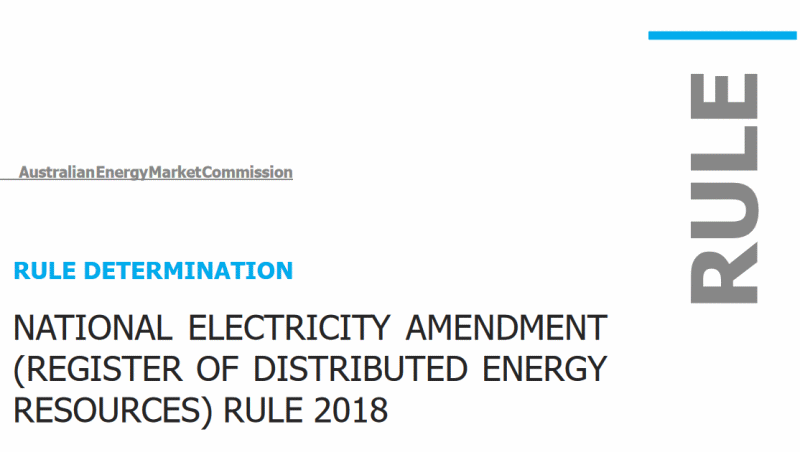Last week the Australian Energy Market Commission released its final rule on establishing a distributed energy resources (DER) register for the National Electricity Market.
The AEMC announced consultation on a national register in March this year. The exercise evolved from a rules change request back in 2016 from the COAG Energy Council – and the Finkel Review also gave the idea the thumbs-up.
The register would cover various forms of distributed energy resources, including residential solar panel and home battery installations.
Currently, information on small scale solar power system installation is relatively easy to source from a single location as Australia’s Clean Energy Regulator keeps track of all systems accompanied by Small-scale Technology Certificates (STCs), which form the basis of Australia’s “solar rebate”. However, keeping tabs on battery system installations has been difficult as the Regulator doesn’t track all these and many energy storage installs haven’t been reported to Network Service Providers.
The situation led to the Queensland Government offering $50 to battery system owners for their information in order to create a database until such time the national register was established.
The national register is still some way off. The AEMC’s final rule states the new DER register must be in place by 1 December 2019, with the Australian Energy Market Operator (AEMO) to create and publish the first information guidelines for the register by 1 June 2019.
“The register will give network businesses and AEMO visibility of where distributed energy resources are connected to help in planning and operating the power system as it transforms,” states the Commission.
DER Register Data Sharing And Privacy
The rule requires network service providers to request specific information to be outlined by the AEMO in the yet-to-be-created guidelines, which will then be submitted to the Operator. The AEMO would also be obligated to report publicly relevant information periodically at an “appropriate level of aggregation”.
As to how the data may be otherwise shared, one example is with an emergency services agency for the purposes of that agency’s response to an emergency situation or emergency response planning. But that’s not where data sharing with other parties will end.
Of some concern is this:
“Sharing information with third parties: periodic reporting by AEMO of DER register information on an aggregated basis may be of benefit to bodies such as to policy-makers, researchers, consultants and other market participants or investors.”
However, the AEMC and some other stakeholders believe existing regulatory arrangements, which would apply, should address any potential privacy and confidentiality concerns that the DER register may raise.
The final determination can be viewed here (PDF).
In other recent related news from the AEMC, last week the Commission kicked off a consultation on a draft rule that it says will give NEM customers greater control over electricity meter changes and see deadlines implemented for electricity meter changeovers. Under the new rule, electricity retailers could face fines of up to $100,000 for each missed deadline, and $10,000 for each day of delay.


 RSS - Posts
RSS - Posts



So, will this apply to Western Australia, given that we are not regarded as part of Australia (except when it comes to taking our money), or, as part of the NEM?